568 detainees, including members of MSD party and protesters against the 3rd term, were released on Monday (23 January) from Mpimba Central Prison. The presidential pardon announced by Nkurunziza in his New Year’s speech concerns 2,500 prisoners. Some people speak of a more political measure than that of good faith.
Written by Martine Nzeyimana and Rénovat Ndabashinze .Translated by Pierre Emmanuel Ngendakumana
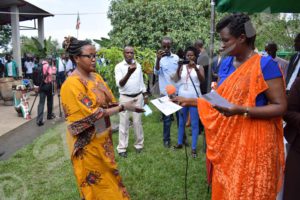
Aimée Laurentine Kanyana, handing a certificate of release to a recipient of the presidential pardon
Among these prisoners, 58 members of the Movement for Solidarity and Democracy (MSD) were arrested on 8 March 2014.
Without giving the exact number, Aimée Laurentine Kanyana, Minister of Justice said that even protesters against the third term of Burundi President Pierre Nkurunziza were among these pardoned detainees. “This is a gift from the President of the Republic because they were not expecting to be released given both human and material destruction caused during the insurrection,” she said. Perpetrators of the imprescriptible crimes were also freed: “If we speak of imprescriptible crimes, that is to say crimes for which no pardon can be granted,” she explained. Nevertheless, she said the President of the Republic has the right to take a measure for this category of people. And this depends on the evolution of the situation or the behavior demonstrated by the concerned, he said.
The Minister of Justice said the release is intended to reduce prison congestion up to 60 percent in 2017. Gervais Hajayandi, Director General of Penitentiary Affairs, said Mpimba Central Prison alone is home to 3605 prisoners whereas it has the capacity to receive 800 prisoners…
To the “opponents” released, Mrs. Kanyana told them that the “insurrection” has failed and that peace reigns in the country: “You have lost your fight, peace reigns for the moment.
Stay away from those who can once again manipulate you into the insurrection. ”
Conscious of the high cost of living, she advised them to write a letter to the President of the Republic in case of financial difficulties instead of taking to criminal acts.
Joy but worry, too
Joy could be read on most faces of the recipients of this presidential grace. Some even did not believe it before receiving a certificate of release. “This is a big surprise for me. I have to wait until I get out of here to talk to the media, “says smilingly a woman, member of MSD party who kept looking at her watch as if the hours did not go by.”A salutary measure,” says another beneficiary: “I was arrested during the demonstrations against the 3rd term and did not expect a release.”
Another freed man also said he was happy. “Life was very difficult here, but we could at least eat once a day. But it seems that the famine is raging through the country. We need to be assisted, “he pleads, adding that he had spent more than two years in prison.”We call on the President of the Republic to release all political prisoners so that together with those who are being prosecuted and those who have fled, we can rebuild our country “, he said.
Other released people are very distressed. They do not even want to be photographed. “We must first be in our families to talk to the media,” they said, while concealing their faces. “We fear for our security once we arrive in our neighborhoods,” complains a young member of MSD party.
He said he was very traumatized by cases of young people released and found dead after they had been caught and used by agents of the National Intelligence Service (SNR).
Apart from some citizens of Bujumbura City, all the persons released were taken back to the provinces of origin by police trucks.
Who are the released people and their convictions?
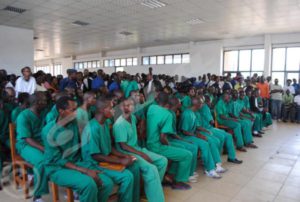
Appearance of MSD party defendants in Bujumbura High Court.
58 members of MSD party benefited from the presidential pardon after more than two years behind bars.
As a reminder, in the morning of March 8, 2014, a hundred young people from MSD party, scarves with the colors of the party around the neck and other banners, were doing sport. When they arrived in Bujumbura city center around 10 am, they encountered a police unit that dispersed them.
Around 20 of them were captured and taken to the public prosecutor’s office and Mpimba prison. Other young people fled to the MSD party’s national office, located in the south of Bujumbura.
Policemen chased them by tear gas, the young people responded by throwing stones.
At the party’s office, about ten young people are arrested after an assault led by the police. The following day, other people were arrested. In total, more than 70 people had been imprisoned in Mpimba Central Prison since 8 March.
Was it a severe verdict?
The first appearance of the members of MSD before the High Court of Bujumbura Municipality took place on Saturday 15 March. Only 24 of the 71 prisoners were heard. This was the beginning of an interminable trial.
All the prisoners were therefore accused of three offenses: participation in an insurrectionary movement, affront to and violence towards authorities or the police.
They were sentenced to 10 years in prison. However, during the trial, the Director of Public Prosecutions added section 599 to justify the required life imprisonment against the accused. A total of 22 members were sentenced to life imprisonment, ten members for ten years and 14 members five years.
Similar cases, different verdicts.
It is difficult to know the exact number of protesters against the 3rd term who have been arrested and imprisoned. They were picked up in different places and at different times. On Monday, 19 October 2015, approximately 100 demonstrators appeared before the Bujumbura High Court.
Record of MSD defendants: Life sentence: 22; Ten years: 10; Five years: 14.
Protesters’ cases: 6 months: 1; 2 years with one year of reprieve: 22; 2 years: 102; 3 years: 13; 5 years: 3.
On Tuesday, 24 November 2015, while the facts were almost identical, the Bujumbura City Council High Court issued separate verdicts for the latter and the youth of MSD party.
Four offenses were then laid against the members of Alexis Sinduhije’s party: rebellion, voluntary assault, public affront to the police and participation in an insurrectionary movement. According to the Criminal Code, such crimes are punishable by a 10, 2, 3 year sentence in jail and life sentence respectively.
The verdict of the judge was far less severe than the prosecution’s charge of life sentence.
On 24 November 2015 , one demonstrator was sentenced to 6 months in jail, 22 demonstrators were sentenced to 2 years in jail with one year suspended, 102 sentenced to 2 years in prison, 13 sentenced to 3 years and three others to five- year jail sentence.
>>Reactions
Belgium is pleased with the decision
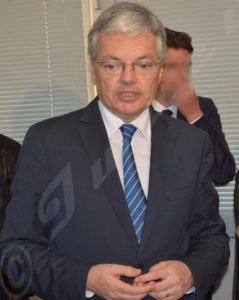 Didier Reynders, Head of the Belgian Diplomacy finds that this is a step in the right direction and an opening gesture by the Burundian authorities. He hopes that other prisoners of conscience will be able to benefit from such a measure.
Didier Reynders, Head of the Belgian Diplomacy finds that this is a step in the right direction and an opening gesture by the Burundian authorities. He hopes that other prisoners of conscience will be able to benefit from such a measure.
“It’s a good sign”
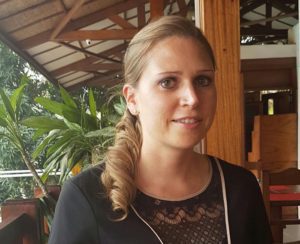 “Human Rights Watch welcomes the presidential pardon of 2,500 prisoners, including political prisoners,” said Ida Sawyer, on behalf of HRW. “It’s a good sign. The judicial system should release those who have been arrested arbitrarily”. For her, the regime should ensure that the safety of all citizens and that of those released are guaranteed.
“Human Rights Watch welcomes the presidential pardon of 2,500 prisoners, including political prisoners,” said Ida Sawyer, on behalf of HRW. “It’s a good sign. The judicial system should release those who have been arrested arbitrarily”. For her, the regime should ensure that the safety of all citizens and that of those released are guaranteed.
” A surprise “
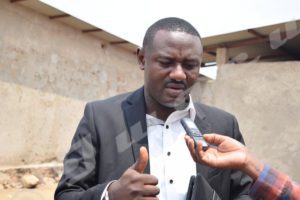 On the release of the political prisoners, Jacques Nshimirimana, president of the Federation of associations engaged in the children’s domain in Burundi said that this was new: “It was a surprise to see the political prisoners who were accused of having participated fully in the demonstrations, being released “. According to him, it may be related to political reasons but it is a laudable act.
On the release of the political prisoners, Jacques Nshimirimana, president of the Federation of associations engaged in the children’s domain in Burundi said that this was new: “It was a surprise to see the political prisoners who were accused of having participated fully in the demonstrations, being released “. According to him, it may be related to political reasons but it is a laudable act.
“A tactic to coax donors”
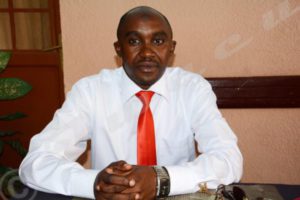 Speaking on behalf of Cnared, Jérémie Minani, said it was a good thing. This does not mean, however, that the regime has changed: “It is a tactic to coax donors in order to benefit from the alleviation of sanctions”.
Speaking on behalf of Cnared, Jérémie Minani, said it was a good thing. This does not mean, however, that the regime has changed: “It is a tactic to coax donors in order to benefit from the alleviation of sanctions”.
Faced with the economic downturn, he analyzes, the only way for the government to get closer to donors is to lie that it is releasing opponents.
“An action of good faith or propaganda?”
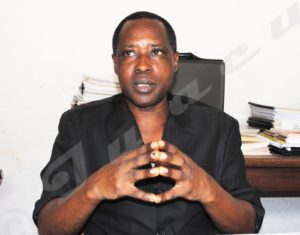 “The question is whether it is a work of good faith or propaganda”, wondered Léonce Ngendakumana, vice president of Frodebu opposition party. Given the organization of this day, he does not doubt that the regime aims to disillusion the International Community and to be more liberal. The release of political prisoners is one of the conditions to resume cooperation.
“The question is whether it is a work of good faith or propaganda”, wondered Léonce Ngendakumana, vice president of Frodebu opposition party. Given the organization of this day, he does not doubt that the regime aims to disillusion the International Community and to be more liberal. The release of political prisoners is one of the conditions to resume cooperation.
“It’s not sufficient”
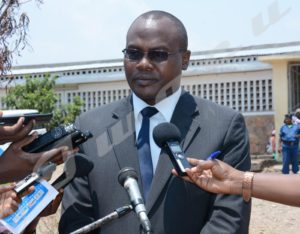 “Our wish is to see a large number of prisoners benefit from freedom and prisons be relieved,” said Jean Baptiste Baribonekeza, president of the Independent National Commission for Human Rights (CNIDH). He said, however, that it was not enough: “Other measures should be taken to ensure those found in prisons are the real convicts”.
“Our wish is to see a large number of prisoners benefit from freedom and prisons be relieved,” said Jean Baptiste Baribonekeza, president of the Independent National Commission for Human Rights (CNIDH). He said, however, that it was not enough: “Other measures should be taken to ensure those found in prisons are the real convicts”.
“A great advance”
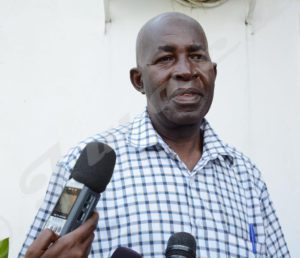 Pierre Claver Mbonimpa, a civil society activist thinks this action is laudable: “It’s a big step forward.” But it’s a drop in an ocean. In order to relieve the prison congestion, he proposes the release of all political prisoners and perpetrators of minor offenses.
Pierre Claver Mbonimpa, a civil society activist thinks this action is laudable: “It’s a big step forward.” But it’s a drop in an ocean. In order to relieve the prison congestion, he proposes the release of all political prisoners and perpetrators of minor offenses.
Clarification
On Monday, in Mpimba Central Prison, Minister of Justice Aimée-Laurentine Kanyana said perpetrators of imprescriptible crimes have benefited from the presidential pardon. Iwacu has approached Lawyer Dieudonné Bashirahishize.
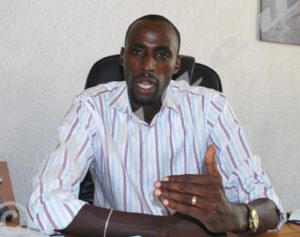
Lawyer Dieudonné Bashirahishize
“In Burundi, Article 146 of Act No. 1/05 of 22/4/2009 on the revision of the Penal Code, stipulates that prosecution is prescribed after a period of between one year and 30 years, without prosecution, “he said, adding that these timeframes vary depending on the seriousness of the offense. And Article 150 of the same law states that the public prosecution of crimes of genocide, war crimes and crimes against humanity falls in the prosecution of the category of imprescriptible crimes.
Lawyer Bashirahishize says that the time factor plays no role: “Thus, more than 50 years after the genocide of the Jews, the Nazis were and remain hunted down, like the perpetrators of genocide in Cambodia who are still judged more than 40 years later, etc.”
According to him, except for crimes without statutory limits, all other crimes may be pardoned. Indeed, he explains, imprescriptible crimes exceed the sovereignty of the states because they are committed against the whole humanity.
Once proven, the UN can order the ICC to prosecute the perpetrators even if the authorities pardon or support the crimes. “Even when a State has not ratified the Rome Statute, prosecutions are carried out without the consent of the State concerned”.
Thus, analyzes Mr Bashirahishize, the penalties resulting from convictions for crimes without statutory limits are not concerned by the presidential pardon. As a result, the Minister’s statement is erroneous, except that for the Minister, having an opinion contrary to the regime is a crime without statutory limits. He is also convinced that no one of those “released prisoners” was prosecuted for an imprescriptible crime. “They were prosecuted for interfering with the internal or external security of the state, which is often an offense against political prisoners or opinion leaders.”
With regard to the prescription of the punishment, he pointed out that it was a period beyond which a criminal conviction, which had become definitively punishable but whose execution had not begun, was abandoned.
The other mode of leaving out the punishment is the pardon which consists in the total or partial surrender by the executive power of the penalties pronounced in their commutation into other less serious penalties determined by the law.
However, Article 170 states, nevertheless, that pardon does not exclude sentences imposed on genocide, war crimes and crimes against humanity.
According to him, there are two other legal mechanisms which lead to the disappearance of the possibility of putting the sentence into execution: “It is amnesty and rehabilitation which eliminate not only the execution but also the condemnation as a whole.”Amnesty is the act by which the legislature forbids the exercise or continuation of criminal prosecution and removes convictions.
Genocide, crimes against humanity and war crimes cannot be subject to any amnesty law under article 171 of the Criminal Code.
As for amnesty, Article 177 specifies that it is the combination of pardon and amnesty that the legislature uses to introduce more justice in the application of the amnesty.
And by virtue of section 179, Mr. Bashirahishize indicates that amnesty clears or reduces criminal convictions and leaves the other effects of the public action or condemnation. In short, he concludes, amnesty is therefore an amnesty granted to a category of condemned people by the legislator for individuals who have obtained a decree of pardon taken by the executive.

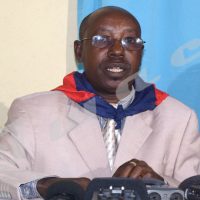
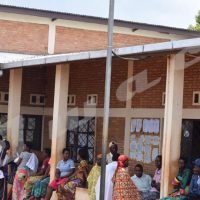
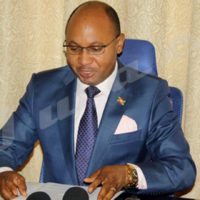
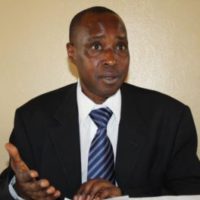
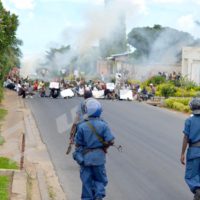













 IWACU Open Data
IWACU Open Data

